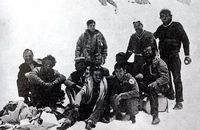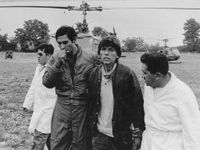Álvaro Mangino Schmid, one of the 16 survivors of the infamous Andes plane crash of FAU 571, passed away in Montevideo on Saturday, March 29, 2025, at the age of 72. His death was announced by the Old Christians Club, the rugby team to which many of the crash victims belonged. The plane, a Fairchild aircraft of the Uruguayan Air Force, tragically crashed into the Andes at an altitude of 3,600 meters on October 13, 1972.
The community of the Stella Maris School and the Old Christians Club expressed their deep sorrow on social media, stating, "The community of the Stella Maris School and the Old Christians Club deeply regret the departure of Álvaro Mangino Schmid." This sentiment reflects the profound impact Mangino had not only on those who survived but also on the wider community touched by his story.
On that fateful day, the plane was transporting the Old Christians rugby team to Chile for a match. Of the 40 passengers on board, 13 died instantly upon impact, while others succumbed to their injuries or the extreme cold in the days that followed. An avalanche on October 29 further complicated the dire situation, yet 16 individuals managed to survive for an astonishing 72 days in the unforgiving snow.
Among those who survived were notable figures such as Gustavo Zerbino, Fernando Parrado, and José Luis Inciarte. Currently, 13 of the original 16 survivors are still alive, following the recent losses of Mangino, 'Coche' Inciarte in 2023, and Javier Methol in 2015.
Mangino's journey to the ill-fated flight was almost thwarted; he had initially hesitated to join the trip. In a recent interview, he recalled, "I wasn’t even supposed to go. I was convinced by Marcelo Pérez, the team captain, who insisted I join. He was a persuasive friend." This decision would lead him into one of the most harrowing experiences imaginable.
During the crash, Mangino suffered severe injuries, including fractures to his left tibia and fibula. This left him largely immobilized, forcing him to crawl or stay in makeshift hammocks constructed by his fellow survivors. Remarkably, he spent the entire 72 days of survival without walking.
As the days turned into weeks, the group faced unimaginable challenges. With dwindling supplies and no shelter, they were forced to confront the harsh reality of survival. Mangino later described the moment he and the others had to resort to cannibalism, saying it was "the most difficult decision I made in my life." This grim choice became a lifeline for the survivors, who endured temperatures plummeting below -30 degrees Celsius.
The rescue operation was launched only after two of the young men trekked for ten days to find help. Their ordeal, known as the "Miracle of the Andes," has inspired numerous books and films, including the recent Oscar-nominated movie "La sociedad de la nieve," directed by J.A. Bayona.
In the film, Mangino's story is depicted with great sensitivity, showcasing his resilience and spirit. Bayona praised Mangino's contributions during the filming, stating, "Despite his disability from the fracture, he never stopped working in the mountains, constantly melting snow to provide water for his companions."
Reflecting on his experience, Mangino emphasized the importance of gratitude and perseverance. He once shared, "The first lesson I learned from this experience is that in life, one can always be worse off, and we must be thankful for what we have. With attitude, hard work, and faith, one can achieve anything in life. We all face our own mountains, and we must learn that we can always rise up."
After the tragedy, Mangino married his girlfriend Margarita Arocena, with whom he had four children. He spent many years living in Brazil before returning to Montevideo, where he worked in a heating and air conditioning company. His life was marked by a profound sense of gratitude, often attributing his survival to the love and support he received from Margarita.
In February 2024, during the promotion of "La sociedad de la nieve," Mangino shared a poignant moment from his last visit to the site of the crash. He recounted a moment of connection with his lost friends, stating, "Once we descended and reached the camp where we spent the night, the sky gifted us a double rainbow. I like to think it was a sign from my friends who stayed behind, telling us they were happy we came to visit."
As the world mourns the loss of Álvaro Mangino, his legacy as a symbol of survival and resilience endures. His story is a testament to the strength of the human spirit in the face of unimaginable adversity, reminding us all of the power of hope, love, and community.
Álvaro Mangino's remarkable journey through the Andes will continue to inspire future generations as they learn about the incredible bravery and determination of those who faced the unthinkable.
In the end, Mangino's story is not only one of survival but also one of profound love and friendship, illustrating how those bonds can carry us through even the darkest of times.





